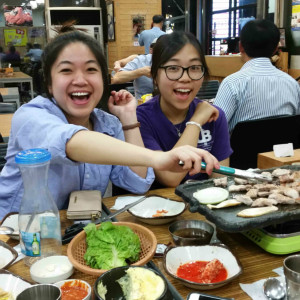The Korean Workplace Atmosphere
The Korean workplace atmosphere is an important thing to take note of in teaching. This is the atmosphere around you when you aren’t in the classroom teaching. You’ll either be in your own abode planning lessons in your empty classroom, or if it isn’t exclusive to you, you’ll be working in the Teachers’ Office.
 Having your own classroom is a sweet deal because it’s an English-only room that may be in a different section down the hall, with English phrases or Anglo-country pictures on the walls. Obviously, a Korean Math teacher won’t be teaching here! That’s the set-up I have at one school, and get to have my own peace planning lessons until the next class starts.
Having your own classroom is a sweet deal because it’s an English-only room that may be in a different section down the hall, with English phrases or Anglo-country pictures on the walls. Obviously, a Korean Math teacher won’t be teaching here! That’s the set-up I have at one school, and get to have my own peace planning lessons until the next class starts.
At my next school, I work in a teachers’ office. There are about 10 workers in my specific office, some are teachers and some administrative workers. We sit at long tables and work at our computers. Nothing extraordinary.
Different things happen in the office besides work. Colleagues frequently gather over coffee or a snack (usually Korean rice cake “tteok”, fruit or tomatoes), students walk in and out to talk with teachers, and the teachers/admin workers will just stand around and talk.
Before I moved here, I e-mailed the previous teacher at my school and asked about the workplace atmosphere. I remember the specific phrases she used, saying it can be “awkward” and “isolating” as you don’t speak Korean and they don’t speak English.
Well, in all those aforementioned instances above, I can say she was kind of right. I get invited over for a coffee or snack at times, but there’s only so much sheepish smiling you can do with a language barrier between you.
Obviously, making the effort to learn the language in a new country is essential in bonding with people better, and I’ve done that. I study Korean and have Korean friends outside of work, but at work, my Korean is too basic to properly engage in a full on conversation, so it’s not easy.
Types of co-workers
You’ll have some co-workers who do speak English, but the thing that I’ve realized is either they’ll be brave and make frequent efforts to talk to you, or they will just be ridiculously shy and not speak at all. I’d say that’s been my latest battle because here you have someone who actually speaks English (I know you speak it!), but you never even try to talk to me.
However, one of my Korean friends told me that it’s usually shyness, disinterest or not wanting to show off in front of others, being the reasons for those co-workers not making the effort to speak.
On the flipside, you’ll have some who don’t speak English at all, but are SO kind, always smile at you, say hello and want badly to make conversation (to the point where google translate is used) but just can’t. Those you can surely appreciate.
Lastly, there are some people who will straight up disregard you as if you aren’t even there. No eye contact, no response, no engagement. That’s fine, you build a thick skin, learn to be within yourself more, and don’t let it deter a damn thing about your experience. You’re there for the kids, and when those kids like you, trust me, everyone will hear about it.
Lunch atmosphere
School lunch is a huge gathering of students and teachers eating together. We teachers have our own table and food line, but we’re still next to the kids. Lunch can either also be isolating or it can be stifling. Isolating for obvious reasons mentioned before, but you don’t care as much when you’re chomping down on good Korean food.
It can be stifling, though, because it frequently can be all eyes on you. Teachers may be admiring your chopstick skills (even after 5 months, as if it wouldn’t be learned by now), or seeing if your food is separated correctly on your tray, or speaking Korean to other teachers while glancing or gently pointing your way (and you know they’re talking about you when you hear the word for foreigner “waygook”).
There’s always one teacher who will tell you where a certain food should be or how it should be mixed. It’s great learning how to eat Korean foods, and you will appreciate that kindness. You’ll also feel at times like you want to stop being looked at as if you’re some exhibit, and just want to eat in peace.
Not so bad
All in all, like any workspace, you’ll have colleagues you bond with and others you don’t. It’s easier here as you can zone out from conversations, and be to yourself. You learn to entertain yourself more and work efficiently.
The hardest part is not being able to express yourself to others, as you’ll feel sometimes like people think you’re some quiet, fragile, unexposed being, who is making no effort to learn their language.
The reality is that it couldn’t be further from the truth, and it can be challenging not being able to show them that. Just remind yourself, you’re there for the kids and that’s who needs to adore and remember you.
Have you ever taught English in Korea before? What were your experiences like with the workplace atmosphere? Let us know your thoughts in the comments section below.




